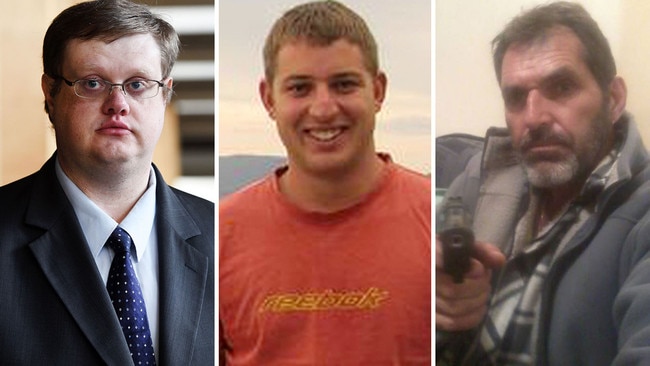Government reviews sex offender secrecy laws amid claims they protect rapists and paedophiles
SECRECY laws that stop the public from knowing the identity of alleged sex offenders for months after they are charged are under review by the State Government, amid criticism the automatic suppression orders protect rapists and paedophiles.

SA News
Don't miss out on the headlines from SA News. Followed categories will be added to My News.
Your right to know week:
- Furore over secrecy around teacher arrested over sex offences
- Politicians’ perks — every MP’s register of interests revealed
- Council chiefs’ pay — some earn more than state ministers
- How police are protected by a ‘cone of silence’
SECRECY laws that automatically stop the public from knowing the identity of alleged sexual offenders — or any element of the prosecution case — for months or in some cases even years after charges are laid are under review by the State Government.
It comes as public outcry mounts after an Adelaide school was legally not allowed to name a teacher who has this week been charged with sexual offences.
Attorney-General Vickie Chapman told The Advertiser that her government was “looking at” the operation of that particular section of the Evidence Act.
“We will be making a decision about this in due course,” she said.
The media is banned from revealing alleged sexual offenders’ identities until the case is handballed to the District or Supreme Courts or there is a final outcome in the Magistrates Court.
The media is also gagged from informing the public about any evidence or allegations until an outcome in the Magistrates Court or committal to a higher court.
In 2011, former Northern Territory Chief Justice Brian Martin conducted a review of the law and recommended it be scrapped.
But the then-Labor Government opted for a halfway measure, instead allowing the media an opportunity to argue against suppression orders if it was in the public interest.
Justice campaigner Sonya Ryan, whose daughter Carly was murdered by an online predator in 2007, urged a review of the suppression orders.
“Suppression orders protect perpetrators of sexual abuse when the focus should be on protecting our children and preventing further harm,” she said.
“Releasing identities could encourage other victims to come forward.”
University of South Australia legal expert Professor Rick Sarre supported the law, saying once someone has been smeared with a sexual innuendo — and later found not guilty — the damage was impossible to erase.
“It’s not like there’s some Star Chamber and we never find out who the person is,” he said.
He said once the accused is committed to trial or found guilty, the blanket suppression ceases to apply and the identity can be revealed, adding that the public can go to open court and see for themselves who the accused is.
But Prof Sarre said the added element of suppressing the allegations in those early stages of proceedings was a “pretty tight blanket”.
Despite supporting the law, he did concede that SA was “out of kilter” with the rest of the country in relation to banning evidence being published in a sex offence case before committal or guilty verdict.
Law Society of SA president Tim Mellor also backed the current law, saying it recognised that sexual offences were “understandably met with revulsion by the general public”.
“The tension between the public’s right to know and the protection of victims and defendants in court is particularly pronounced in matters involving allegations of sexual offences,” he said.
“The stigma that can attach to a victim of sexual offence, or an accused who is acquitted, can cause trauma and lifelong reputational damage.
“This can result in situations where an accused person who was never found guilty may never be able to escape the intense stigma and loathing reserved for the most reviled section of the community.
“Another reason to protect the identity of a defendant is to safeguard against vigilante attacks.”
Victims rights advocate Michael O’Connell said victims’ privacy should not be sacrificed as a result of the review.
“It must be their choice whether to lift the legal veil intended to protect them,” he said.
He said the law should be amended so those who identify victims of sexual offending on social media were subject to the same threat of prosecution as mainstream media.
Prof Sarre said South Australia had come a long way in terms of having a more transparent justice system.
“Going back two decades, South Australia became the suppression capital of Australia, when just about everything was suppressed by the courts,” he said.
He said judicial secrecy reached its peak during the Snowtown “bodies in the barrels” case of John Justin Bunting and Robert Joe Wagner which trickled through the courts between 1999 and 2004.
“There was a backlash and now we can safely say South Australia is in line with the rest of the country with what is and what is not suppressed,” he said.
Prof Sarre said the biggest boost to transparency came in 2011 when laws changed to allow the media an opportunity to argue against suppression orders.
Over the past three financial years, the number of gag orders imposed by SA courts has dropped by 20 per cent.
In 2017/18, there were 170 court-imposed suppression orders granted — down from 192 the previous financial year.
There were 209 orders slapped on South Australian court proceedings in 2015/16.
The Adelaide Magistrates Court imposed the most orders at 87 — or 51 per cent — of all orders made in 2017-18, followed by the District Court with 50 and the Supreme Court with 26.
SA Chief Justice Chris Kourakis said judicial officers consider each suppression application on its merits.
“Changes in the number of orders made annually reflect the number of cases, in that year, in which there were circumstances warranting the making of a suppression order,” he said.


